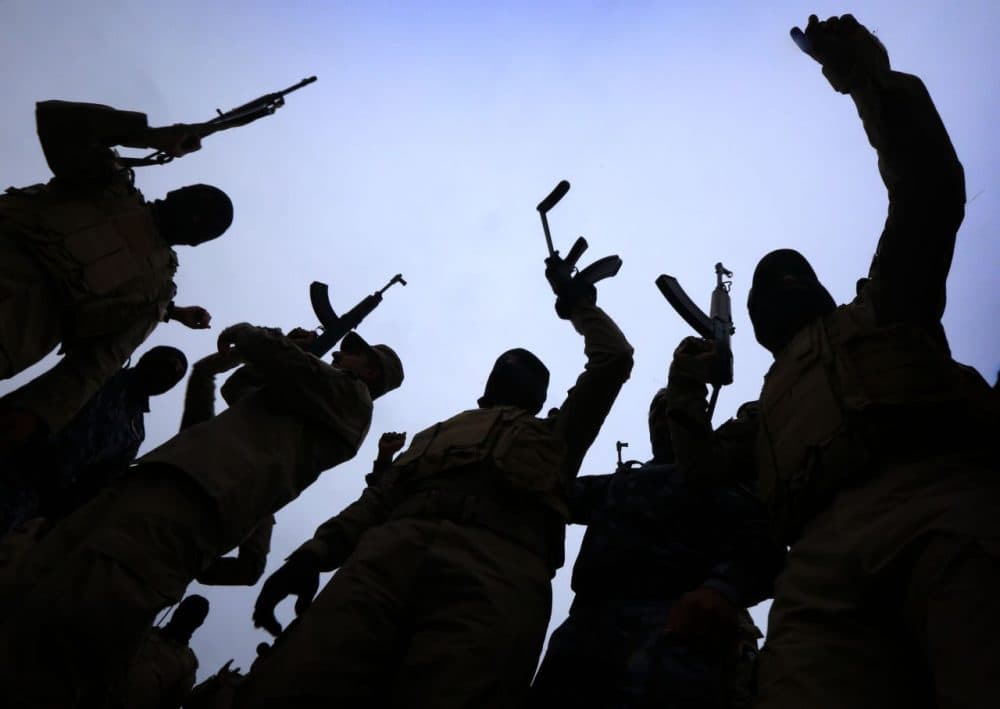Advertisement
How The Iraq War Informed The Rise Of ISIS
Resume
Our series of conversations about the ripple effects of the Iraq War continues with Rajiv Chandrasekaran, who covered the Iraq War for the Washington Post. His book, "Imperial Life In The Emerald City: Inside Iraq's Green Zone," documents what happened in Baghdad after the U.S.-led invasion of Iraq in 2003.
"We helped break that country," he told Here & Now's Jeremy Hobson. "Saddam did a lot of breaking too, but we did our part, and we have an obligation to help."
Interview Highlights: Rajiv Chandrasekaran
Observations on the current fight against ISIS in Iraq
"I see a fight that has its roots in failures and miscalculations that were made back in 2003. When we look at why the Sunni Arab population across northern, central and western Iraq seem to be casting their lot with ISIS as opposed to the central government, when we ask ourselves, 'Why isn't the Iraqi army doing a better job in fighting? Why aren't the political leaders in Baghdad coming together to forge the necessarily political compromises to stabilize their country?' I go back to the very earliest months after U.S. forces and U.S. civilian leaders descended upon Baghdad in the spring and summer of 2003, and some of the fateful original sins of our early occupation of that country."
"The decision to disband the Iraqi army, to ban many mid-level members of the Ba'ath party from ever participating in political life again. Moves that had a disproportionate impact on the Sunni Arab population, sending many of them essentially into the arms of the nascent insurgency, telling them that they really didn't have a future in the grand experiment that was going to be the new Iraq."
On the threat ISIS poses outside of Iraq
"Insofar as some of these dusty villages are concerned that they're in control of ISIS as opposed to the central government in Iraq, it probably doesn't pose a direct threat to the United States and its allies. But here's the big issue: ISIS as a whole, in Syria and Iraq, has recruited about 20,000 foreign fighters from more than 80 different countries. And many of those foreign fighters will probably wind up dead, others may go home and discover that what they did was pretty bad and try to get back on the straight and narrow."
"But in the most conservative of estimates, you'll have many, many hundreds of those individuals going back to their home countries, not just the United States and Western Europe, but across Africa, other parts of the Middle East. And many of them may well seek to continue their violent struggle, but back at home. So the threat, the ISIS problem, is in some ways less of a, 'What's the future of Iraq?' but 'What does this group pose in terms of a long-term threat to the rest of the world?'"
Does Iraq still matter?
"I think it still matters an awful lot. It sits in a very strategic location in the Middle East. It's essentially a buffer state between Shiite Persian Iran and the Sunni Arab monarchies of the Persian Gulf. It has a lot of oil under its sand. But it also is a multi-ethnic, multi-sectarian country. Of course that's been a source of a lot of the tension, but it is a society that could represent the future of a more pluralistic Middle East. It's the sort of place that I think it is in our interest to show that people from different backgrounds can live in harmony side by side. They did so for many, many years in that country."
Guest
- Rajiv Chandrasekaran, former Washington Post editor and war correspondent and author of "Imperial Life In The Emerald City: Inside Iraq's Green Zone." He tweets @rajivscribe.
This segment aired on July 8, 2015.